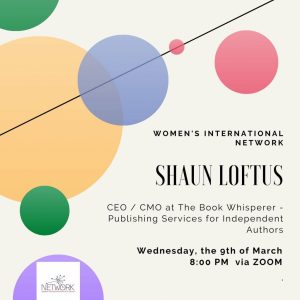Indie Summoner: Shaun Loftus If you have a book in you, here’s how to publish it
Shaun Loftus, interviewed by hostess, WIN Speaker Coordinator, Elia Nichols
March 2022 Meeting speaker recap
by L.A. Robbins
In early March WIN members and guests were treated to an energetic, informative talk from Shaun Loftus, whose company, The Book Whisperer, provides Indie (independent) authors with all aspects of publishing, ‘from building platforms to building scenery, editing your story or helping you tell it.’
 Book whispering looks to be conjuring a success for Shaun; from one employee at the start, she now manages a team of six. She took her self-publishing business online in 2018 and now manages close to 40 authors. Her most prolific clients put out up to eight books a year and earn in the seven figures. ‘I work with creative people who are following their dreams’
Book whispering looks to be conjuring a success for Shaun; from one employee at the start, she now manages a team of six. She took her self-publishing business online in 2018 and now manages close to 40 authors. Her most prolific clients put out up to eight books a year and earn in the seven figures. ‘I work with creative people who are following their dreams’
For wannabe authors in our cohort, Shaun provided an enthusiastic rundown of who, what, when, where, why, and how in an interview with WIN Speaker Coordinator, Elia Nichols.
Here’s the scoop, honest Indie:
Why publish in the traditional manner?
Large traditional publishers have larger budgets; they have PR departments, and they will handle everything for you from editing to cover designer to marketing. There is also a matter of the prestige – but not all publishing houses are the same, and one might be better off self-publishing rather than working with a small or hybrid publisher.
What’s the disadvantage of traditional publishing?
Time. From the time involved in writing a book ‘to landing an agent to finally getting a publisher to appearing in bookstores can be years’. Larger houses won’t even look at you unless you have an agent, who earns 15% of the 20-25% of royalties that you can expect. Smaller publishers may not have the market reach, and may not actually invest in your project if it isn’t an immediate hit – and it is rare that you will be paid any sort of advance. Hybrid publishers can be an option, but an author working with a hybrid publisher will often pay the costs of production and you will still be responsible for publicity and advertising.
Why Indie publish?
‘You write what you want, you maintain control over every decision, from cover to marketing to ad spend and there are no gatekeepers stopping you.’ The Indie process is speedy compared to traditional publication. You get 70% of the royalties, as compared to the far lesser amount you’d make through a trade or hybrid publisher. Of course, there’s a downside: you need to make a financial investment in a process that you will play a rather large role in, especially in the marketing. Yet, more and more often, even traditional require authors to invest in their own marketing – not just small publishing houses, but big ones as well.
The Indie market is huge and can lead to promising avenues. ‘Some Indie-published books are snapped up for film and television (its rare, but it does happen.)
If you have a story and want it in print, Indie publishing is really a boon, especially if you have a little money to promote your title.’ If you want to burnish your business reputation ‘this is a low-cost investment in your reputation and looks great on a resume’. Yet, doing this professionally (read: lucratively) means several books in a series before you begin to see a return on your investment. You need to know the market and be prepared to compete within a particular genre.
Shaun spoke of the multiple social media platforms independent (Indie) authors use to get their work out there, focusing on Facebook and Amazon. Amazon’s market for self-publishers is vast; the company showcases over 2,800 genres. ‘There’s an audience for everything. Amazon owns 85-95% of the e-book market and 70% of the print book market in the US.
What’s happening in the e-book market?
‘It’s exploding.’ In addition to Amazon there is Apple I-books and Kobo, among other distributors.. E-books reader sales are rising, and paperbacks are printed on demand and arrive to your readers within a day or two. are those who order
With respect to Europe, Germany is strong in the e-book market; France, Spain and Italy are only emerging.
What is the easiest way to self-publish a book? Indie-file, one step at a time.
‘It’s not that hard, but there are lots of parts,’ says Shaun.
Start by editing. A developmental editor provides the zoom out needed to create effective structure. A line editor ensures clarity and the most effective prose. A copy editor proofreads for the grammar and mechanics that make the final product professional. Formatting and layout illustrate the way the pages will look. Shaun stressed the benefits of e-print and paper print, functions provided by Amazon, Kobo, Apple, Google, and Ingram Spark. Cover design is the next step. This is a custom piece of art work which conveys the essence of your story.
Does your book need to be finished before you begin steps toward publication?
No. But to chivvy along the success of your work, before it is published you need to build an audience through a social media. You might distribute excerpts of your book, especially if you are a debut author. Shaun emphasises the importance of pre-selling the book before it is even available. She suggests eliciting editorial reviews before the book is released, and advertising on Facebook and Amazon. Authors might swap writing reviews with other authors in the same genre. Eventually, you need a strong newsletter subscriber list; in book publishing, everything is about the relationship with the reader.
How did you begin this work?
‘I got lucky at the start. The first book I looked at was about first century Christianity in ancient Rome. I know this topic; I’m a big nerd. I pointed out problems (errors) in the author’s work… and (next thing she knew) I was asked to be the editor.’ A theater major who learned website design and online market, Shaun is harvesting the benefits of this fruitful art and tech combination. ‘I am used to working with creative people. I am skilled at artwork, posters and graphic and marketing. I learned to code in the early 1990s. So I have production and digital marketing skills: the perfect background for what I do now.’
What makes a good book?
It depends on if it’s non-fiction or fiction. Keep in mind that 85% of today’s readers are female. There are successful indie writers in almost every genre, from Romance to Historical Fiction to Sci-Fi and fantasy. We have also had successful launches in business, spirituality, and pet care.
Whether your book is successful hinges on the zeitgeist. What will that be two-and-a-half years from now? Who knows?!
.
How should we target the market?
Write what you love to read. And write honestly. Don’t be emotionally manipulative’; don’t use too many big words. Be yourself.
One little, two little, three little Indies… and now… 35
At present The Book Whisperer has 35 clients. Shaun is not actively seeking more. She can afford to be quite selective about who she works with, for instance, she eschews Sci Fi and Fantasy. She will take on a new author only if she thinks the book has a chance. ‘I know the market well.’
What does it cost to work with The Book Whisperer?
Emerging authors can expect to invest between $4,800 and $5,200* for an initial typical three-month contract. All the risk is on the author: whether the book makes money depends on how well it is marketed. ‘For my little company, we act as publisher for Indie authors, but we do not take a percentage. We will arrange editing for authors (and yes, you DO need professional editing), will find and consult with cover designers (and yes, you DO need a professionally designed cover). We do the formatting, take care of the technical needs, help authors set up their platforms (websites, social media), and we run their advertising for them. We help arrange ISBN, copyright, distribution and all those other small things that are simple to do, but a bit of a hassle. We are overjoyed when we have a best-seller, and heartsick when we do not – but we are very clear with our authors as to the market prospects of their title and what sort of competition they are facing (this is especially important for first time authors – you need to know things like how many books per day one needs to sell to achieve a return on investment – if this is your goal. We charge in US dollars, and many of our clients are on retainer. We have many clients who have 20-30-50 books in their catalogue, so we have a huge focus on ongoing marketing – and we have a pretty long wait-list.
*I want to make it clear that we are expensive because we invest a lot of work into each project. However, indie publishing is absolutely something an author can do for themselves. There are tons of great books and youtube videos and terrific websites that will walk new authors through the process step by step.
Does Shaun offer consultations?
Yes. Just now ‘we’re going into a heavy season; we had five book launches last month.’
Overall advice for Indie writers?
‘Publishing a book requires that you have a heartfelt project and a strong ambition to see it through. You also need a thick skin and you absolutely need to control your expectations. You will not get rich quickly.’ Shaun warns.
‘You need to get to know the industry. There is lots of information online. Investigate the market.’
Recently Shaun moved to a spacious home in the Tuscan countryside. She and her family enjoy the company of two dogs, a cat, two birds and a lizard in Pelago, less than an hour’s drive from Florence.
Looking ahead, Shaun mentioned the Indie Unconference, which will take place in Matera this June. This is a peer-to-peer, author-led gathering of writers and book makers.
For further information, reach Shaun at authors@bookwhisperer.ink and put your request in the subject line. She is CEO/CMO of the Book Whisperer, Publishing Services for Independent Authors
Website http://shaunloftus.com

